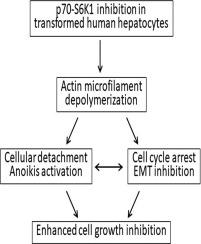Life Sciences ( IF 6.1 ) Pub Date : 2020-11-13 , DOI: 10.1016/j.lfs.2020.118764 Tapas Patra , Sandip K. Bose , Young-Chan Kwon , Keith Meyer , Ranjit Ray

|
Aims
The mTOR/S6K1 signaling axis, known for cell growth regulation, is hyper-activated in multiple cancers. In this study, we have examined the mechanisms for ribosomal protein p70-S6 kinase 1 (S6K1) associated transformed human hepatocyte (THH) growth regulation.
Main methods
THH were treated with p70-S6K1 inhibitor and analyzed for cell viability, cell cycle distribution, specific marker protein expression by western blot, and tumor inhibition in a xenograft mouse model. We validated our results by knockdown of p70-S6K1 using specific siRNA.
Key findings
p70-S6K1 inhibitor treatment caused impairment of in vitro hepatocyte growth, and arrested cell cycle progression at the G1 phase. Further, p70-S6K1 inhibitor treatment exhibited a decrease in FAK and Erk activation, followed by altered integrin-β1 expression, caspase 8, and PARP cleavage appeared to be anoikis like growth inhibition. p70-S6K1 inhibitor also depolymerized actin microfilaments and diminished active Rac1/Cdc42 complex formation for loss of cellular attachment. Similar results were obtained with other transformed human hepatocyte cell lines. p70-S6K1 inhibition also resulted in a reduced phospho-EGFR, Slug and Twist; implicating an inhibition of epithelial-mesenchymal transition (EMT) state. A xenograft tumor model, generated from implanted THH in nude mice, following intraperitoneal injection of S6K1 inhibitor prevented further tumor growth.
Significance
Our results suggested that p70-S6K1 inhibition alters orchestration of cell cycle progression, induces cell detachment, and sensitizes hepatocyte growth impairment. Targeting p70 isoform of S6K1 by inhibitor may prove to be a promising approach together with other therapies for hepatocellular carcinoma (HCC) treatment.
中文翻译:

抑制S6K1的p70亚型可诱导失神经,从而防止转化的人类肝细胞生长
目的
mTOR / S6K1信号轴以细胞生长调节而闻名,在多种癌症中被过度激活。在这项研究中,我们检查了核糖体蛋白p70-S6激酶1(S6K1)相关的转化人类肝细胞(THH)生长调节的机制。
主要方法
THH用p70-S6K1抑制剂处理,并在异种移植小鼠模型中分析了细胞活力,细胞周期分布,通过蛋白质印迹的特异性标记蛋白表达以及肿瘤抑制。我们通过使用特异性siRNA敲低p70-S6K1验证了我们的结果。
主要发现
p70-S6K1抑制剂治疗引起体外损伤肝细胞生长,并阻止了G1期的细胞周期进程。此外,p70-S6K1抑制剂治疗表现出FAK和Erk活化降低,随后整合素β1表达,胱天蛋白酶8改变,PARP裂解似乎是生长抑制之类的失常。p70-S6K1抑制剂还解聚了肌动蛋白微丝并减少了活性Rac1 / Cdc42复合物的形成,从而失去了细胞附着。用其他转化的人肝细胞系也获得了相似的结果。p70-S6K1抑制也导致磷酸化EGFR,Slug和Twist减少;暗示抑制上皮-间质转化(EMT)状态。腹膜内注射S6K1抑制剂后,从裸鼠体内植入THH生成的异种移植肿瘤模型阻止了肿瘤的进一步生长。
意义
我们的结果表明,p70-S6K1抑制作用改变了细胞周期进程的编排,诱导了细胞的脱离,并使肝细胞生长受损变得敏锐。抑制剂靶向S6K1的p70亚型可能与其他肝细胞癌(HCC)治疗方法一起被证明是一种有前途的方法。


























 京公网安备 11010802027423号
京公网安备 11010802027423号